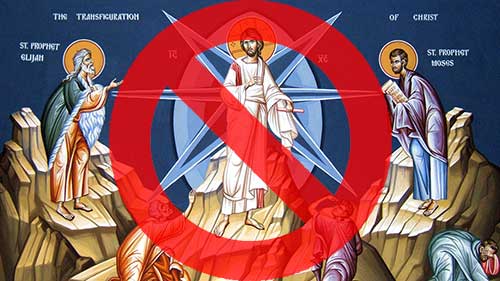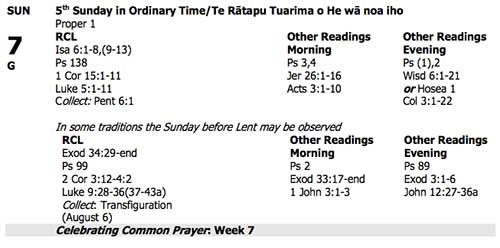
Only read further if you think that the Transfiguration is a significant story for our Christian life and spirituality. I think it is a central gospel celebration which, amongst other things, celebrates and enables our transformation.
It is present in each of the Synoptic Gospels (Matt 17:1-9; Mark 9:2-9; Luke 9: 28-36) and so, we who follow a three-year Sunday reading cycle, with each year working through one Synoptic Gospel, have a different version available to us each year. This is, hence, a compulsory reading on Sunday every year in liturgical churches such as the Roman Catholic Church, the Church of England, The Episcopal Church, and so on.
Except in NZ! Here, in the Anglican Church of Or, options are provided so that a community is only required to read this story on a Sunday once every seven years. The majority of Christians today, and throughout history read the Transfiguration on the Second Sunday of Lent. And that is where I would encourage Kiwi Anglicans to read it. On that day, our lectionary has:

The first Gospel-reading option provided in the Anglican Church of Or is Luke 13:31-35. The Transfiguration story (Luke 9:28-36) is relegated to the second option. The Revised Common Lectionary allows churches to read the Transfiguration on the Sunday before Lent and, although that is not my preferred location, that is the choice the CofE and TEC, for example, have made. But the Anglican Church of Or does not make decisions. It allows every possible optional variant to be available. And so for the Sunday before Lent it has:

The first Gospel-reading option provided in the Anglican Church of Or is Luke 5:1-11 and, once again, the Transfiguration story (Luke 9:28-36) is relegated to a second option.
So a community in the Anglican Church of Or can quite easily skip the Transfiguration story every year, only celebrating it on Sunday once every seven years when August 6 (the Feast of the Transfiguration) falls on a Sunday.
First Sunday in Ordinary Time
Remember that in NZ Anglicanism, Ordinary Time begins after Candlemas/ The Presentation of Jesus in the Temple. So, if General Synod passes Statute 713 this year (which slipped through undiscussed last time and, with all the energy and focus on homosexuality this year, could easily pass through undiscussed this time), then yesterday, Sunday February 7, would be termed “The First Sunday in Ordinary Time”. And good luck then working out what the readings would have been! Maybe yesterday we would have been reading Christ’s baptism story.
Please don’t let Statute 713 pass.
Please can we have a liturgy reboot.
If you appreciated this post, do remember to like the liturgy facebook page, use the RSS feed, and signing up for a not-very-often email, …



Certain schools of theology just don’t know what to do with the Transfiguration. Get in step. Sunday before Ash Wednesday is it. Man up! Read Karl Barth!
I like the Lutheran use that originated back in the 1700’s of having the Transfiguration on the Sunday before Lent, though I also like having it in Lent too. The nice thing about having it on the Sunday before Lent is that it becomes a bona-fide Festival, not another overlooked weekday holy day, with little effort.
One Lutheran friend of mine pointed out that it is a nice way to begin and end both portions of green with festal days (Baptism/Transfiguration – Trinity/Christ the King). I tend to like that logic.
Rob+
Thanks, Fr Rob. Although I have already declared my preference for reading the Transfiguration Gospel on the Second Sunday in Lent (I cannot see how that results in “another overlooked weekday holy day, with little effort”) I also like your point in your second paragraph. Blessings.
When celebrated on a Sunday in Lent, there is a degree of jubilation that is suppressed during the observance of the Transfiguration. Of course, one could point to that as fitting, given Jesus’ exhortation at the end of the event. 🙂
When the Transfiguration is proclaimed on Lent II, it then leaves the festal observance, per-se, on August 6, and since it is not generally considered a Solemnity-level Holy Day, most Christians overlook it, as with the feasts of the apostles, etc. That was the concern I was reflecting on in my post. I do see how that came out a bit unclear.
Either way, I prefer Transfiguration at the end of the post-Epiphany strech of Ordinary Time or on Lent II – connected with the Paschal narrative more closely. I do not care for the August date as a second celebration thereof.
Thanks, Fr Rob. Blessings.